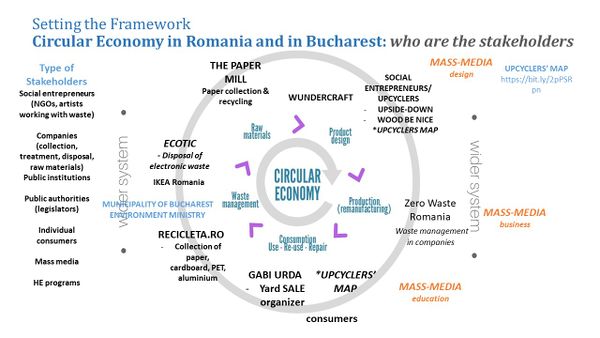Intensive Study Programme Bucharest 2019: Difference between revisions
Jump to navigation
Jump to search
| Line 10: | Line 10: | ||
*'''Participants:''' students and staff members from the Community Learning for Local Change ERASMUS partnership | *'''Participants:''' students and staff members from the Community Learning for Local Change ERASMUS partnership | ||
== | == Why waste is a challenge for Bucharest == | ||
* There is a serious lack of an action-driven waste management system for individual consumers | |||
**What do we do now with the used clothing items, paper, glass, the oil used in cooking, batteries, printers, used tires, plastic (bottles)? | |||
**What could we do differently (better) for the environment? | |||
*Too few companies are using circular economy in their business model | |||
** How do we convince more companies to integrate circular economy principles of reduce, reuse, recycle? | |||
*Serious lack of education for adults on waste management (at home, at work) | |||
**How do we convince consumers to reduce, reuse, recycle various items? | |||
== The Bucharest Ecosystem of Circular Economy == | == The Bucharest Ecosystem of Circular Economy == | ||
Revision as of 16:57, 16 February 2019
>>>Apply now
Key dates of the Bucharest Intensive Study Programme
- Time frame: Monday, May 6 to Monday, May 13, 2019
- Travel days:Sunday, May 5 and Tuesday, May 14
- Host: The Bucharest University of Economic Studies (ASE) and Atelier Merci Charity
- Focus Challenge: Waste Management and Circular Economy
- Workshop Location: Bucharest, Romania
- Participants: students and staff members from the Community Learning for Local Change ERASMUS partnership
Why waste is a challenge for Bucharest
- There is a serious lack of an action-driven waste management system for individual consumers
- What do we do now with the used clothing items, paper, glass, the oil used in cooking, batteries, printers, used tires, plastic (bottles)?
- What could we do differently (better) for the environment?
- Too few companies are using circular economy in their business model
- How do we convince more companies to integrate circular economy principles of reduce, reuse, recycle?
- Serious lack of education for adults on waste management (at home, at work)
- How do we convince consumers to reduce, reuse, recycle various items?
The Bucharest Ecosystem of Circular Economy
Focus Topics
- Exploring Bucharest‘s ecosystem for circular economy
- Recycling, waste management and circular economy
- Cooperation with social businesses already active in the field of waste management:
- SOMARO: social supermarket
- RECICLETA (Viitor Plus association): Management of paper, cardboard, PET, aluminum.
- GOOD BOUTIQUE, Red Cross Romania: Management of textiles through recycling and reusing
- The Canvas Workshop - Atelierul de Panza: Management of textiles through recycling and reusing
- How to strengthen the capacity of social enterprises based in Bucharest
- addressing concrete challenges the sccial businesses are currently facing
Mission of the Bucharest Community Innovation Lab
- A space (online and onsite) promoting a new approach to promote creativity, entrepreneurial thinking and skills for designing innovation in close cooperation with the communities in which the University is embedded. Hosted by the Bucharest University of Economic studies.
- A learning tool to achieve the main goal of the project: to develop, establish and maintain a new framework for linking University to its local communities.
- A starting point for co-creation and co-founding of local entrepreneurial solutions to local problems.
- A voice for the local challenges and the change makers (social entrepreneurs, businesses interested in implementing circular economy principles, etc).
